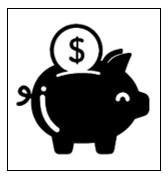Do you remember the words of the disco song from the early 1980s by Donna Summer - “She works hard for the money”? It reminds me of my childhood. I was trained from an early age by my parents to save my money. The very first job that I had was hoeing bean fields for farmers. That’s when I started collecting my quarterly hours for Social Security. I was just eleven years of age. I've also detasseled corn. One summer job, which I hated the most, was picking rocks out of a farmer’s field before they would plant their crops. I was so happy when I finally turned sixteen because I could finally work inside of a factory instead. It was a vegetable canning factory with a choice of two shifts. You could either work from 7:00 am to 7:00 pm or 7:00 pm to 7:00 am. I can remember one week when I was eighteen, I had forty-three hours of overtime, which meant I had worked a total of eighty-three hours that week. After high school, my wife and I worked hard to make certain that we were as cash- “available” as we could be because we were not cash-“rich”.
Now, this is not a ‘Mark, it sounds like you had a horrible childhood’ story. I learned to work to save, which gets us to what we are discussing today. We have been going over the twenty-five different areas of your life where you have micro-managers that assist you with your financial life, and the first one that you typically are exposed to in life is your bank.

When I was a child, there was a rule in the Bertrang household, at least for us kids. We could put money into our savings account, but we seldom, if ever, could take money out. I was only allowed to take money out on two separate occasions. Once was $50.00 for my junior prom and then another $50.00 for my senior prom. I learned the importance of saving and the importance of working with a bank.
Today, the bank is where you can go to “rent” money. You rent someone else’s money to do things like purchase a car. You rent someone else’s money to be able to buy a house with a mortgage. I call it “renting” because a bank takes deposits, turns around, and then rents those deposits out to someone else in the form of loans. So, are you a depositor or are you a renter?
Some people will say you should never have a mortgage or an auto loan. I always believe that it depends upon your situation. I’m a perfect example. I am at the very, very tail end of my home mortgage. I would never pay ahead on this loan because our mortgage rate is 2.7%, and I can deposit or invest my money someplace elsewhere, where I should be able to do better than 2.7%. Why would I give the bank extra money so they could just turn around and rent it to someone else at 6 or 7% or even higher? Why would I give them that opportunity? Banks are just the middleman between their depositors and people who need to rent money.
The bank doesn’t make money outright. They make money on the ‘spread’, i.e. the difference between what they pay on deposits and what they rent that money for. When I drive around town, I look at the nicest buildings in town, and other than public buildings like universities and governmental buildings, the nicest buildings are typically banks. The money that paid for those nice buildings is what they've made on their 'spread'. They’re doing pretty well.
Starting early in your life, it’s going to be important to be able to work with a bank to acquire (i.e. rent) money for a mortgage, a car, a real estate investment, or a business investment. The key is that a banker should be a partner. They should never be your master.
As you are determining the proper spread between money that you don’t have and money that you need to rent, I want you to think hard on if it makes fiscal sense for you. Remember, the bank is just one of the micro-managers in your financial life.
If you would like to spend some time looking at the whole deck of financial cards and see how one micromanager interacts with another, then perhaps it’s time to schedule your Financialoscopy®.
